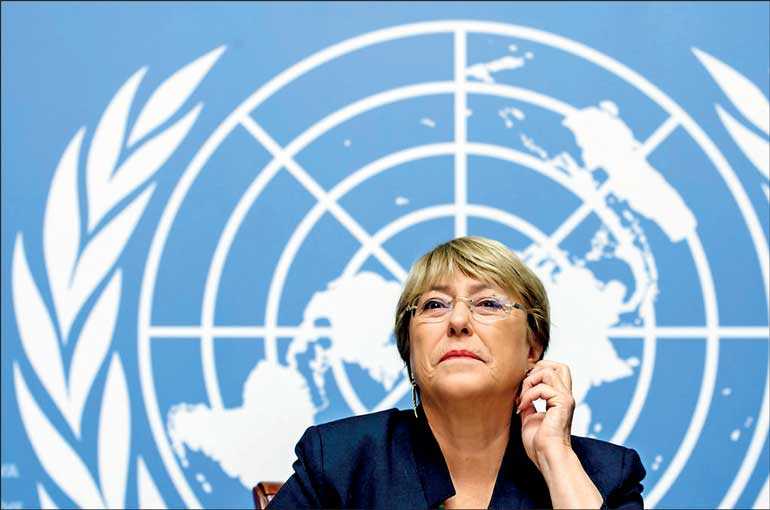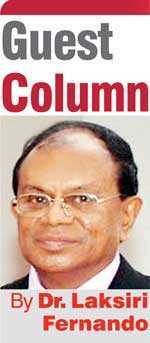Sunday Feb 22, 2026
Sunday Feb 22, 2026
Wednesday, 3 March 2021 00:00 - - {{hitsCtrl.values.hits}}

United Nations High Commissioner for Human Rights Michelle Bachelet
 Did or did not Sri Lanka face separatist terrorism from the LTTE and other sources? Why cannot the so-called High Commissioner for Human Rights accept this truth? Why instead, does the High Commissioner’s Report directly and indirectly try to justify that separatist terrorism? It appears that the words ‘terrorism’ and ‘separatism’ have been taboo to the High Commissioner. However, criticisms about ‘Buddhism,’ ‘Sinhala-Buddhist ethno-nationalism’ and ‘majoritarianism’ frequently appear in the Report.
Did or did not Sri Lanka face separatist terrorism from the LTTE and other sources? Why cannot the so-called High Commissioner for Human Rights accept this truth? Why instead, does the High Commissioner’s Report directly and indirectly try to justify that separatist terrorism? It appears that the words ‘terrorism’ and ‘separatism’ have been taboo to the High Commissioner. However, criticisms about ‘Buddhism,’ ‘Sinhala-Buddhist ethno-nationalism’ and ‘majoritarianism’ frequently appear in the Report.
Armed conflict or ethnic conflict?
Among other excuses for separatism and terrorism the following appears in the Report: “In Sri Lanka, armed conflict emerged against a backdrop of deepening discrimination against and the marginalisation of the country’s minorities, particularly the Tamils.”
What is the picture given? The ‘diagnosis’ here is that the ‘armed conflict’ emerged because or ‘against a backdrop’ of deepening discrimination and the marginalisation of the Tamils.’ In justification of this ‘diagnosis,’ some others have quoted the Lessons Learnt and Reconciliation Commission (LLRC) report. However, what the LLRC report said was the following: “The Commission takes the view that the root cause of the ethnic conflict in Sri Lanka lies in the failure of successive Governments to address the genuine grievances of the Tamil people.”
There is a difference. The High Commissioner was talking about ‘the armed conflict’ but the LLRC was talking about the ‘ethnic conflict.’ Are these the same? It also should be noted that the LLRC report qualifies the grievances as ‘genuine grievances.’ It is true that the LLRC report also refers to the armed conflict in a very generous manner and says the following because one of its mandates was Reconciliation: “The country may not have been confronted with a violent separatist agenda, if the political consensus at the time of independence had been sustained and if policies had been implemented to build up and strengthen the confidence of the minorities around the system which had gained a reasonable measure of acceptance.”
It should be noted the LLRC report’s open-ended qualification ‘the country may not have been confronted.’ It is not a diagnosis but an opinion/speculation. As a record of history, it also should be noted that the separatist agenda came soon after independence from the Ilankai Tamil Arasu Kadchi (ITAK) in 1949. It is true that the citizenships acts came in 1948 depriving the hill country Tamils of their citizenship, but it is not from that community the separatist agenda emerged.
Are the reasons objective?
In social science and political science analyses, there can be other reasons for ‘violent separatist agendas’ in the ideological sphere other than objective reasons. We should not quote passages just rhetorically without understanding the nuances. I never got the opportunity to go before the LLRC, because of travel, but I had the opportunity to meet some of the members later and their views were quite concerned, magnanimous, and fully committed to reconciliation and resolving the problems that all communities were facing. The LLRC report is one building block for possible reconciliation.
What I would quote below is what the prominent British historian, Eric Hobsbawm, quoted and analysed about the roots of this separatist ideology in his famous ‘Nations and Nationalism’ (latest edition, 2012, pp.6-7). I was reluctant to quote this before for the last several years for the sake of reconciliation but given the distortions and attempts by the High Commissioners (present and the last) to resurrect separatism and probably terrorism in Sri Lanka, it is timely that I quote and bring it to the notice of the public. First, his quote came from the Ilankai Tamil Arasu Kadchi (ITAK), manifesto, ‘The Case for a Federal Constitution of Ceylon,’ Colombo, 1951.
“The Tamil-speaking people in Ceylon constitute a nation distinct from that of the Sinhalese by every fundamental test of nationhood, firstly that of a separate historical past in the island at least as ancient and as glorious as that of the Sinhalese, secondly by the fact of their being a linguistic entity different from that of the Sinhalese, with an unsurpassed classical heritage and a modern development of language which makes Tamil fully adequate for all present-day needs, and finally by reason of their territorial habitation of definite areas.”
Unfortunately, S.J.V. Chelvanayakam was the brain behind these concepts or principles. These are the concepts later developed into the Vaddukoddai Resolution (1976) and Thimphu Principles (1985). Hobsbawm said immediately after quoting the above passage that: “The purpose of this passage is clear: it is to demand autonomy or independence for an area described as ‘over one third of the island’ of Sri Lanka, on grounds of Tamil nationalism. Nothing else about it as it seems.”
This was soon after independence and not later. Of course, the Tamil people have had so many grievances after independence and even before because of neglect of their areas and discrimination. These should have been negotiated on an objective and reasonable grounds by their true representatives. However, the federalist or separatist demands were based on a nationalist ideology, or ideologies of the political leaders. Hobsbawm considered these demands to be unreasonable and unrealistic. He was not a Sinhala nationalist.
Hobsbawm’s insight
After expressing his dismay and unreasonable nature of the territorial demands of Tamil nationalism (too long to quote here) he said the following with reference to the 13th Amendment.
“In fact, in the negotiations which led to the end of the Sri Lankan civil war in 1987, the decision to do so was a straightforward political concession to the demands of the Tamil nationalists.”
Hobsbawm’s book was first published in early 1990. He even thought that given the above concession, the war would end. Unfortunately, it did not. He said: “As we have already seen the ‘linguistic entity’ conceals the unquestionable fact that indigenous Tamils, immigrant Indians and Moors are – so far – a homogeneous population in no other than the philosophical sense, and, as we shall see, probably not even in this sense.”
He went further and had a prophesy at the end of the analysis. “As for the ‘separate historical past,’ the phrase is almost certainly anachronistic, question-begging or so vague as to be meaningless. It may, of course, be objected that patently propogandist manifestos should not be scrutinised as they were contributions to the social sciences, but the point is that almost any classification of some community as a ‘nation’ on the grounds of such purportedly objective criteria would be open to similar objections, unless the fact that it was a ‘nation’ could be established on other grounds.”
It was to establish this ‘nation’ or ‘Eelam’ on other grounds that Prabhakaran fought through terrorism. But he and others failed. The UN High Commissioner for Human Rights or others therefore, in my concerned opinion, should not directly or indirectly try to justify and resurrect it again.